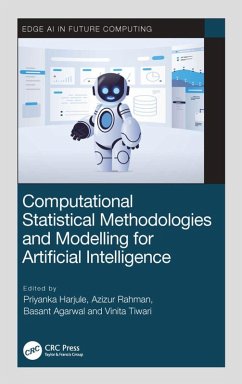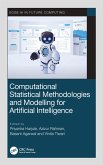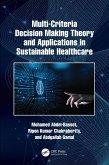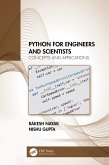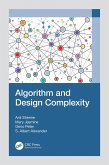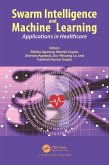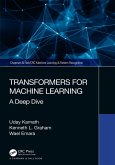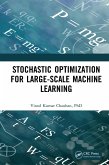Computational Statistical Methodologies and Modeling for Artificial Intelligence (eBook, PDF)
Redaktion: Harjule, Priyanka; Tiwari, Vinita; Agarwal, Basant; Rahman, Azizur
46,95 €
46,95 €
inkl. MwSt.
Sofort per Download lieferbar

23 °P sammeln
46,95 €
Als Download kaufen

46,95 €
inkl. MwSt.
Sofort per Download lieferbar

23 °P sammeln
Jetzt verschenken
Alle Infos zum eBook verschenken
46,95 €
inkl. MwSt.
Sofort per Download lieferbar
Alle Infos zum eBook verschenken

23 °P sammeln
Computational Statistical Methodologies and Modeling for Artificial Intelligence (eBook, PDF)
Redaktion: Harjule, Priyanka; Tiwari, Vinita; Agarwal, Basant; Rahman, Azizur
- Format: PDF
- Merkliste
- Auf die Merkliste
- Bewerten Bewerten
- Teilen
- Produkt teilen
- Produkterinnerung
- Produkterinnerung

Bitte loggen Sie sich zunächst in Ihr Kundenkonto ein oder registrieren Sie sich bei
bücher.de, um das eBook-Abo tolino select nutzen zu können.
Hier können Sie sich einloggen
Hier können Sie sich einloggen
Sie sind bereits eingeloggt. Klicken Sie auf 2. tolino select Abo, um fortzufahren.

Bitte loggen Sie sich zunächst in Ihr Kundenkonto ein oder registrieren Sie sich bei bücher.de, um das eBook-Abo tolino select nutzen zu können.
This book covers computational statistics-based approaches for Artificial Intelligence. The aim of this book is to provide comprehensive coverage of the fundamentals through the applications of the different kinds of mathematical modelling and statistical techniques and describing their applications in different Artificial Intelligence systems.
- Geräte: PC
- mit Kopierschutz
- eBook Hilfe
Andere Kunden interessierten sich auch für
![Computational Statistical Methodologies and Modeling for Artificial Intelligence (eBook, ePUB) Computational Statistical Methodologies and Modeling for Artificial Intelligence (eBook, ePUB)]() Computational Statistical Methodologies and Modeling for Artificial Intelligence (eBook, ePUB)46,95 €
Computational Statistical Methodologies and Modeling for Artificial Intelligence (eBook, ePUB)46,95 €![Multi-Criteria Decision Making Theory and Applications in Sustainable Healthcare (eBook, PDF) Multi-Criteria Decision Making Theory and Applications in Sustainable Healthcare (eBook, PDF)]() Mohamed Abdel-BassetMulti-Criteria Decision Making Theory and Applications in Sustainable Healthcare (eBook, PDF)51,95 €
Mohamed Abdel-BassetMulti-Criteria Decision Making Theory and Applications in Sustainable Healthcare (eBook, PDF)51,95 €![Python for Engineers and Scientists (eBook, PDF) Python for Engineers and Scientists (eBook, PDF)]() Rakesh NayakPython for Engineers and Scientists (eBook, PDF)46,95 €
Rakesh NayakPython for Engineers and Scientists (eBook, PDF)46,95 €![Algorithm and Design Complexity (eBook, PDF) Algorithm and Design Complexity (eBook, PDF)]() Anli SherineAlgorithm and Design Complexity (eBook, PDF)46,95 €
Anli SherineAlgorithm and Design Complexity (eBook, PDF)46,95 €![Swarm Intelligence and Machine Learning (eBook, PDF) Swarm Intelligence and Machine Learning (eBook, PDF)]() Swarm Intelligence and Machine Learning (eBook, PDF)51,95 €
Swarm Intelligence and Machine Learning (eBook, PDF)51,95 €![Transformers for Machine Learning (eBook, PDF) Transformers for Machine Learning (eBook, PDF)]() Uday KamathTransformers for Machine Learning (eBook, PDF)45,95 €
Uday KamathTransformers for Machine Learning (eBook, PDF)45,95 €![Stochastic Optimization for Large-scale Machine Learning (eBook, PDF) Stochastic Optimization for Large-scale Machine Learning (eBook, PDF)]() Vinod Kumar ChauhanStochastic Optimization for Large-scale Machine Learning (eBook, PDF)52,95 €
Vinod Kumar ChauhanStochastic Optimization for Large-scale Machine Learning (eBook, PDF)52,95 €-
-
-
This book covers computational statistics-based approaches for Artificial Intelligence. The aim of this book is to provide comprehensive coverage of the fundamentals through the applications of the different kinds of mathematical modelling and statistical techniques and describing their applications in different Artificial Intelligence systems.
Hinweis: Dieser Artikel kann nur an eine deutsche Lieferadresse ausgeliefert werden.
Dieser Download kann aus rechtlichen Gründen nur mit Rechnungsadresse in A, B, BG, CY, CZ, D, DK, EW, E, FIN, F, GR, HR, H, IRL, I, LT, L, LR, M, NL, PL, P, R, S, SLO, SK ausgeliefert werden.
Hinweis: Dieser Artikel kann nur an eine deutsche Lieferadresse ausgeliefert werden.
Produktdetails
- Produktdetails
- Verlag: Taylor & Francis eBooks
- Seitenzahl: 388
- Erscheinungstermin: 31. März 2023
- Englisch
- ISBN-13: 9781000831078
- Artikelnr.: 67654518
- Verlag: Taylor & Francis eBooks
- Seitenzahl: 388
- Erscheinungstermin: 31. März 2023
- Englisch
- ISBN-13: 9781000831078
- Artikelnr.: 67654518
- Herstellerkennzeichnung Die Herstellerinformationen sind derzeit nicht verfügbar.
Priyanka Harjule is currently working as an Assistant Professor at the Indian Institute of Information Technology Kota (IIIT-Kota), India. She holds a Ph.D. from the Department of Mathematics, MNIT Jaipur under the Technical Education Quality Improvement Programme (TEQIP-II) fellowship. She has worked on text classification problems with different machine learning classifiers. Her recent research work includes the analysis of survey data on online education using various statistical techniques. Her research interests include Special functions, Fractional calculus, Mathematical and Statistical Modelling, Machine learning, and Image Processing. Azizur Rahman, PhD, is an applied statistician and data scientist with expertise in both developing and applying novel methodologies, models and technologies. He is the Leader of the "Statistics and Data Mining Research Group" at Charles Sturt University. Azizur earned his Ph.D. from UC and worked at several universities, including the University of Adelaide. He has more than 150 publications, including a few books. The Australian Federal and State Governments fund his research, and he serves on a range of editorial boards. His academic excellence has also been well recognised with several awards, including the best research award by the World Business Institute and research excellence and RED Achievement awards at CSU. Basant Agarwal is an Assistant Professor at the Indian Institute of Information Technology Kota (IIIT-Kota), India. He holds a Ph.D. and M.Tech. from the Department of Computer Science and Engineering, Malaviya National Institute of Technology Jaipur, India. He has more than 9 years of experience in research and teaching. He has worked as a Postdoc Research Fellow at the Norwegian University of Science and Technology (NTNU), Norway, under the prestigious ERCIM (European Research Consortium for Informatics and Mathematics) fellowship in 2016. He has also worked as a Research Scientist at Temasek Laboratories, National University of Singapore (NUS), Singapore. His research interest is in Artificial Intelligence, Cyber-physical systems, Text mining, Natural Language Processing, Machine learning, Deep learning, Intelligent Systems, Expert Systems, and related areas. Vinita Tiwari is currently is an Assistant Professor in the Department of Electronics and Communication, the Indian Institute of Information Technology Kota (IIIT-Kota). She received her B.Tech degree in Electronics and Communication Engineering from M.B.M Engineering collage, Jodhpur followed by a Master's and a Ph.D. degree in Communication Engineering and High-Speed Optical Communication respectively under the faculty development program of BITS-Pilani, Pilani Campus. She has almost fourteen years of experience in teaching and research. Her research interest includes high-speed optical link designs, advanced modulation techniques, Soliton communication, mathematical modeling, blockchain, etc.
1: A review of computational statistical and Artificial Intelligence
methodologies. 2: An improved random forest for classification and
regression using dynamic weighted schem. 3: Study of Computational
Statistical methodologies for modelling the evolution of COVID-19 in India
during the second wave. 4: Distracted Driver Detection using Image
Segmentation and Transfer Learning.5: Review Analysis of Ride-Sharing
Application Using Machine Learning Approaches - Bangladesh Perspective. 6:
Nowcasting of selected imports and exports of Bangladesh: Comparison among
traditional time series model and machine learning models.7: An Intelligent
Interview bot for candidate assessment by using facial expression
recognition and speech recognition System. 8: Analysis of Oversampling and
Ensemble Learning Methods for Credit Card Fraud Detection. 9: Combining
News with Time Series for Stock Trend Prediction. 10: Influencing project
success outcomes by utilising advanced statistical techniques and AI during
the Project Initiating Process.11: Computational Statistical Methods For
Uncertainty Assessment In Geoscience. 12: A comparison of geocomputational
models for validating geospatial distribution of water quality index. 13:
Mathematical Modeling for Socio-Economic Development: A Case from
Palestine.14: A computational study based on Tensor decomposition models
applied to screen of autistic children: High order SVD, orthogonal
iteration and discriminant analysis algorithms.15: Stress Level Detection
using Smartphone Sensors.16: Antecedents and inhibitors for use of primary
healthcare: A case study of Mohalla clinics in Delhi
methodologies. 2: An improved random forest for classification and
regression using dynamic weighted schem. 3: Study of Computational
Statistical methodologies for modelling the evolution of COVID-19 in India
during the second wave. 4: Distracted Driver Detection using Image
Segmentation and Transfer Learning.5: Review Analysis of Ride-Sharing
Application Using Machine Learning Approaches - Bangladesh Perspective. 6:
Nowcasting of selected imports and exports of Bangladesh: Comparison among
traditional time series model and machine learning models.7: An Intelligent
Interview bot for candidate assessment by using facial expression
recognition and speech recognition System. 8: Analysis of Oversampling and
Ensemble Learning Methods for Credit Card Fraud Detection. 9: Combining
News with Time Series for Stock Trend Prediction. 10: Influencing project
success outcomes by utilising advanced statistical techniques and AI during
the Project Initiating Process.11: Computational Statistical Methods For
Uncertainty Assessment In Geoscience. 12: A comparison of geocomputational
models for validating geospatial distribution of water quality index. 13:
Mathematical Modeling for Socio-Economic Development: A Case from
Palestine.14: A computational study based on Tensor decomposition models
applied to screen of autistic children: High order SVD, orthogonal
iteration and discriminant analysis algorithms.15: Stress Level Detection
using Smartphone Sensors.16: Antecedents and inhibitors for use of primary
healthcare: A case study of Mohalla clinics in Delhi
1: A review of computational statistical and Artificial Intelligence
methodologies. 2: An improved random forest for classification and
regression using dynamic weighted schem. 3: Study of Computational
Statistical methodologies for modelling the evolution of COVID-19 in India
during the second wave. 4: Distracted Driver Detection using Image
Segmentation and Transfer Learning.5: Review Analysis of Ride-Sharing
Application Using Machine Learning Approaches - Bangladesh Perspective. 6:
Nowcasting of selected imports and exports of Bangladesh: Comparison among
traditional time series model and machine learning models.7: An Intelligent
Interview bot for candidate assessment by using facial expression
recognition and speech recognition System. 8: Analysis of Oversampling and
Ensemble Learning Methods for Credit Card Fraud Detection. 9: Combining
News with Time Series for Stock Trend Prediction. 10: Influencing project
success outcomes by utilising advanced statistical techniques and AI during
the Project Initiating Process.11: Computational Statistical Methods For
Uncertainty Assessment In Geoscience. 12: A comparison of geocomputational
models for validating geospatial distribution of water quality index. 13:
Mathematical Modeling for Socio-Economic Development: A Case from
Palestine.14: A computational study based on Tensor decomposition models
applied to screen of autistic children: High order SVD, orthogonal
iteration and discriminant analysis algorithms.15: Stress Level Detection
using Smartphone Sensors.16: Antecedents and inhibitors for use of primary
healthcare: A case study of Mohalla clinics in Delhi
methodologies. 2: An improved random forest for classification and
regression using dynamic weighted schem. 3: Study of Computational
Statistical methodologies for modelling the evolution of COVID-19 in India
during the second wave. 4: Distracted Driver Detection using Image
Segmentation and Transfer Learning.5: Review Analysis of Ride-Sharing
Application Using Machine Learning Approaches - Bangladesh Perspective. 6:
Nowcasting of selected imports and exports of Bangladesh: Comparison among
traditional time series model and machine learning models.7: An Intelligent
Interview bot for candidate assessment by using facial expression
recognition and speech recognition System. 8: Analysis of Oversampling and
Ensemble Learning Methods for Credit Card Fraud Detection. 9: Combining
News with Time Series for Stock Trend Prediction. 10: Influencing project
success outcomes by utilising advanced statistical techniques and AI during
the Project Initiating Process.11: Computational Statistical Methods For
Uncertainty Assessment In Geoscience. 12: A comparison of geocomputational
models for validating geospatial distribution of water quality index. 13:
Mathematical Modeling for Socio-Economic Development: A Case from
Palestine.14: A computational study based on Tensor decomposition models
applied to screen of autistic children: High order SVD, orthogonal
iteration and discriminant analysis algorithms.15: Stress Level Detection
using Smartphone Sensors.16: Antecedents and inhibitors for use of primary
healthcare: A case study of Mohalla clinics in Delhi
